It seems you can make milk out of just about any ingredient these days. But not all plant-based milks are created equal. Nutritionally speaking, what plant-based milk has the most protein?
Soy milk has the most protein of all the plant-based milk options. It contains 7 to 20 grams of protein per 8 ounce serving. Many soy milk brands also add protein and other nutrients to their milks, making their product more nutritionally powerful than other plant-based milk options.
However, there are other things to consider when choosing a plant-based milk for your diet, such as calorie-count, nutritional value, and environmental impact. In this article, we’ll explore ten different milks (also known as plant-based mylks), and the benefits and drawbacks of each.
Then, you can decide what’s healthiest for your diet, the planet, and the amount of protein you want to include!
What Plant Based Milk Has the Most Protein?
While there are dozens of plant-based milk options out there for purchase, these varieties have the most protein. The exact grams of protein will depend on the brand of milk you buy.
Plant Based Milk | Protein Per 8oz |
|---|---|
Soy Milk | 7-20g |
Sesame Milk | 8g |
Pea Milk | 4-8g |
Oat Milk | 3-4g |
Hemp Milk | 2-4g |
Pistachio Milk | 3g |
Flax Milk | 3g |
Hazelnut Milk | 3g |
Almond Milk | 1g |
Walnut Milk | 1g |
How Much Protein is in Plant Based Milk?
Let's take a more in-depth look at how much protein is in plant-based milk, as well as some of the other nutritional benefits you can get from them.
Soy Milk
Soy milk has the most similar protein count to regular cow’s milk, with anywhere between 7-20 grams per serving.
At 80 calories per cup, soy milk falls somewhere in the middle of the calorie range for most plant-based milks.
It is lower in sodium than its counterparts, though, as well as carbohydrates. It has around four grams of total fat per serving.
For the environmentally-friendly milk drinkers, soy milk is one of the best milk alternatives if you’re concerned about water conservation.
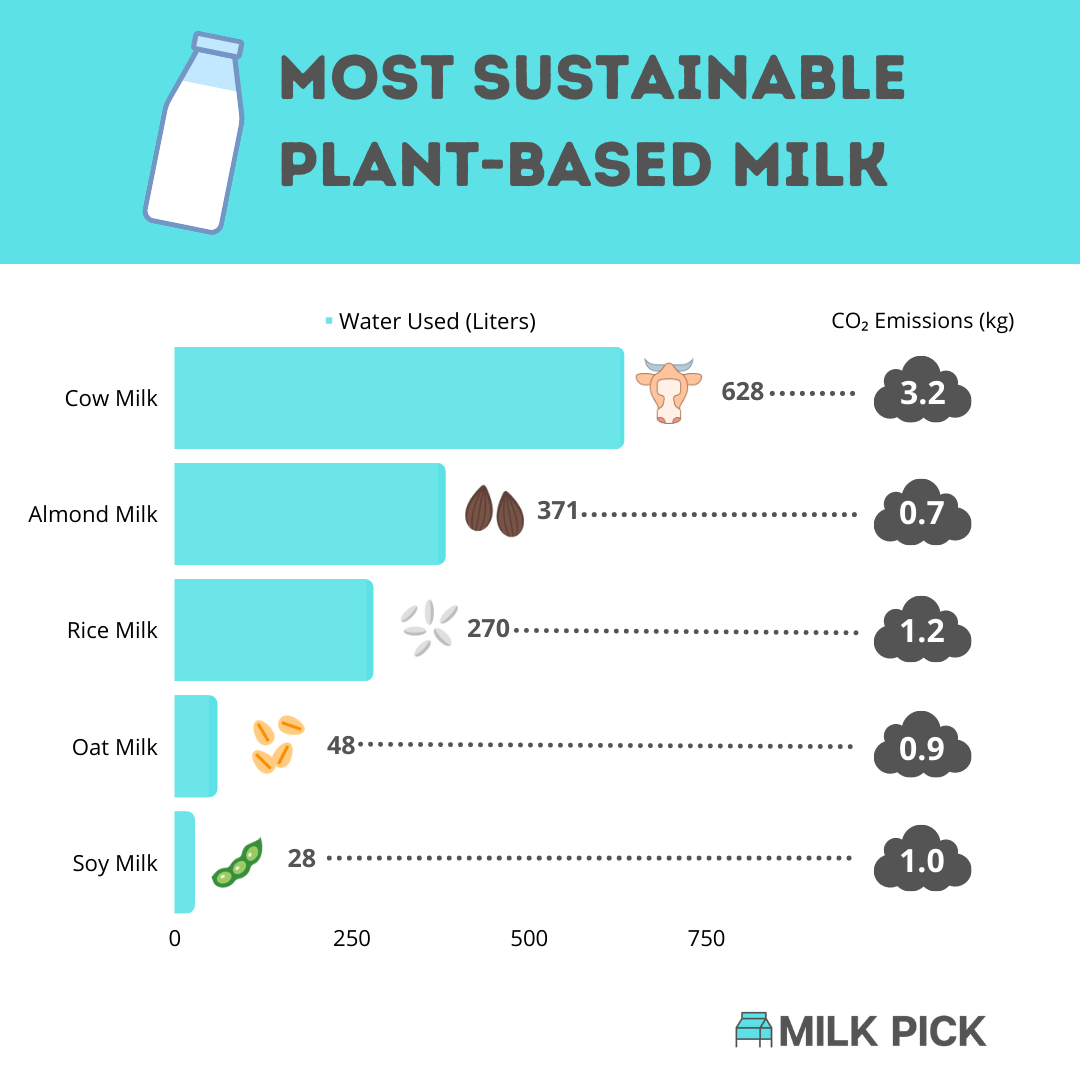
Sesame Milk
Sesame milk is protein rich, with around eight grams of protein per cup, meaning it has a gram of protein per ounce.
Sesame milk uses less water to produce, making it a better alternative to the higher-water milks like almond.
It is packed with nutrients, too, including iron, magnesium, and vitamin D and E. The downside is can be difficult to find sesame milk is grocery stores.
Pea Milk
Pea milk is a popular milk alternative for its high protein content – anywhere from four to eight grams per cup – and its versatility.
It has 100 calories per cup, plenty of iron, calcium, potassium, vitamins D and E, and a nice, creamy consistency that’s especially good in coffee.
Pea milk is made differently than other nut and seed milks. Rather than soaking the peas and blending them into a milk to be strained, pea milk uses pea flour. The protein is separated from the starch and fibrous parts of the flour and blended with water to make milk.
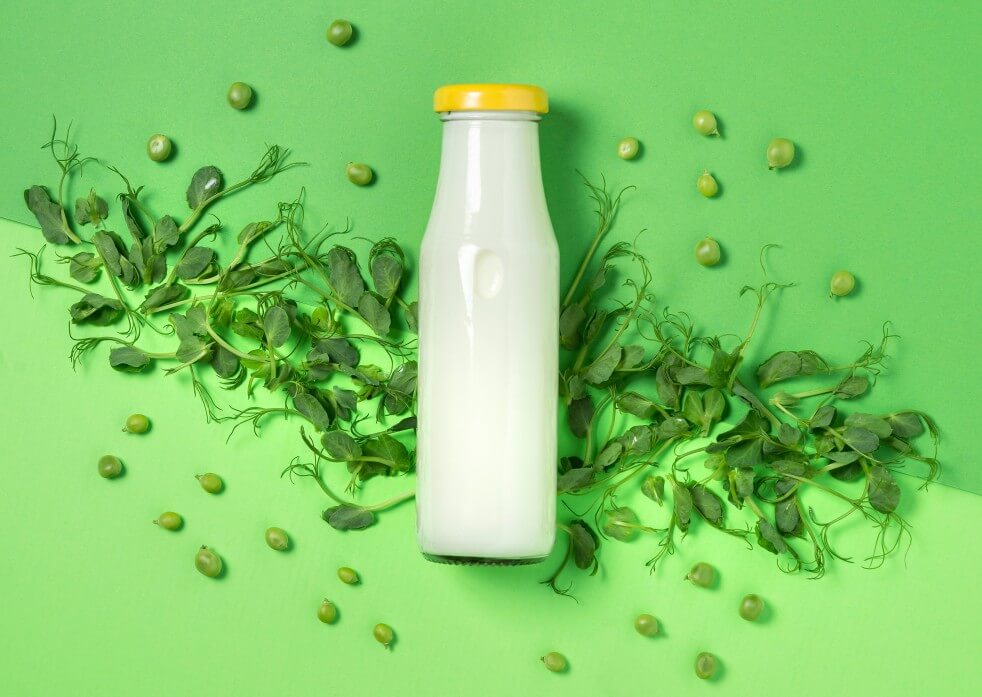
Oat Milk
For those who have nut allergies and want to avoid soy products, oat milk is a great plant-based milk alternative.
Oat milk has three to four grams of protein per eight ounces, and around 120 calories per cup. It has a ton of B12, delivering around 50 percent of the recommended daily value.
Oat milk is also incredibly easy to make at home. Simply blend up one-part oats to three parts water, then strain. You can add salt, dates, or other flavors to enhance the taste of your oat milk while blending.
Here's a great video on how to make oat milk from Downshiftology, a popular YouTube channel for healthy recipes.
This is a great way to control the ingredients in your plant-based milk and avoid some of the fillers that you’ll find in commercial products.
Concerned about gluten? Oat milk is gluten free when made from certified gluten-free oats, just double check the label!
Hemp Milk
Hemp milk is lower in calories than other plant-based milks, with just 60 calories per cup and anywhere between two and four grams of protein.
Hemp milk is also very simple to make at home by blending seeds with water and straining, as seen in this video from Tasty Yummies!
Some hemp milks purchased commercially will be fortified with added nutrients like vitamin D and calcium, making their nutrient profile a healthy competitor to almost any plant-based milk on the shelf.
Hemp, while derived from the same cannabis plant as marijuana, is very different from the product people smoke and consume for psychotropic effects.
Hemp milk must contain less than .3 percent of THC, so it is highly unlikely that hemp milk will cause you to feel any of the effects that marijuana would.
Pistachio Milk
Pistachio milk has three grams of protein per eight ounces, and just 70 calories per cup.
Sweetened pistachio milk has more like 90 calories per cup, but it’s very easy to make unsweetened pistachio milk at home without any additives.
While the milk makes a nice alternative to other nut and seed-based milks, its nutrient profile is diminished by the fact that pistachio milk is mostly water.
Only around three percent of the pistachio actually makes it into the milk blend, meaning you’re not getting the nutrients found in the whole nut.
Most of the nutrients you get from pistachio milk will be from commercial fortification.
Pistachio milk is also very expensive when compared to other nut and seed milks. It is delicious, however, if you enjoy the taste of pistachio.
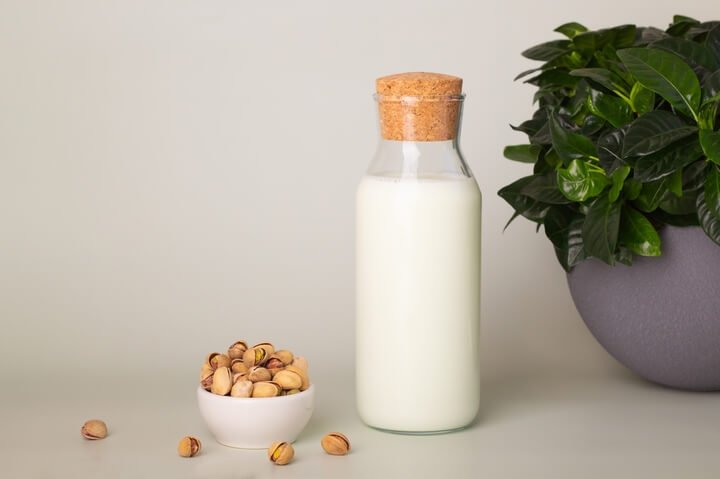
Flax Milk
Flax milk offers around three grams of protein per eight-ounce cup, zero cholesterol, and just 2.5 grams of fat.
But the powerhouse nutrient in flax milk is really its omega 3.
A single eight-ounce serving offers the consumer 1,200 milligrams of omega 3 and lots of monounsaturated and polyunsaturated fats, which are great for the health of your heart.
Omega-3, or alpha linoleic acid, has been shown to reduce people’s risk of cancer, strokes, and heart disease, and can lower blood pressure and blood sugar.
People who need to avoid phytoestrogens should avoid flax milk, because flax milk is rich in lignans which mimic estrogen.
Hazelnut Milk
With three grams of protein per serving and almost three grams of fiber, hazelnut milk is a strong contender in the plant-based milks competition.
However, buyer beware: hazelnut milk is also high in calories and fat. An eight-ounce serving of hazelnut milk rings in at 178 calories and 17 grams of fat.
But, if you can stomach the calories and fat content, hazelnut milk provides other benefits that not all plant-based milks offer. Those include high levels of manganese, healthy monounsaturated and polyunsaturated fats, and the ability to decrease cholesterol when consumed appropriately.
Keep in mind, hazelnut milk is not safe for consumers with tree nut allergies.
Almond Milk
Almond milk is surprisingly low in protein, offering only a gram per eight-ounce serving.
This is because almond milk is mostly water, after the almond pulp has been strained out.
While the nut snack on its own offers many nutrients, most of those are removed during the process to make the milk.
Almond milk is very low in calories, however, with just 30 calories per cup.
It is one of the lowest-calorie plant-based milks on the market.
For that reason, it’s a great choice for people trying to make healthier dietary choices while also reducing their weight.
Naturally, almond milk is also high in vitamin E.
Just one serving will provide the consumer with a quarter of their recommended daily value.
Even better, drinkers will get 30% of their recommended daily value of calcium in just one cup of almond milk.
Environmentally speaking, though, almond milk may not be the best choice.
While it uses less land than dairy milk and creates far fewer greenhouse gases, it requires a ton of water. It’s also bad news for the bees.
Almond trees also require pollination, which means around 70 percent of all commercial bees are used to pollinate almonds each year.
Around a third of those bees die from the pressure.
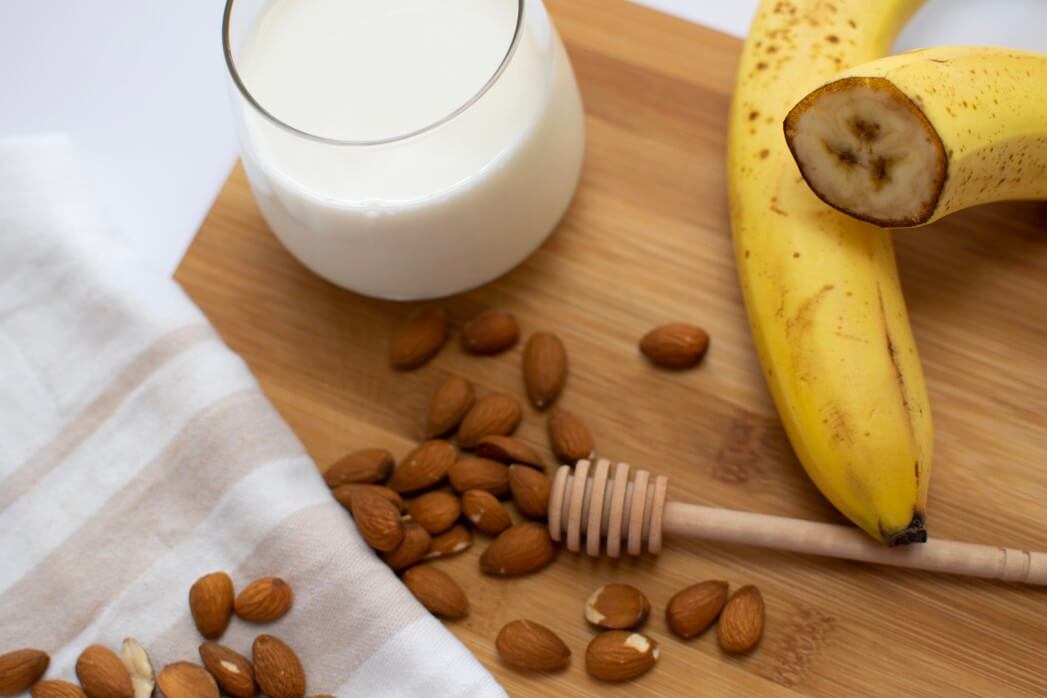
Walnut Milk
Walnut milk contains around four grams of protein and 182 calories per cup, however, that’s only if you make it yourself.
Commercially purchased walnut milk has more like a gram of protein because it uses fewer walnuts to make the milk. Making your own walnut milk the nutritional preference, in this case.
Walnut milk is low in carbohydrates but high in antioxidants that protect against inflammation in the body. Walnut milk also has essential fatty acids like alpha linolenic acid, also known as ALA.
ALA can decrease your odds of dying from heart disease, and it protects your brain. Some studies link it to improved cognitive function and the ability to solve problems faster and improve your memory!
Lastly, walnut milk may be able to keep you fuller longer. Walnuts have higher fiber content than other nuts. But again, this rarely applies to a commercially produced walnut milk. You are better off making your own.
How Much Protein Does Regular Milk Have?
Regular milk, which most consider cow’s milk in the Western world, contains around 8 grams of protein per cup whether you choose fat-free milk, low-fat milk, or whole milk. That’s according to the U.S. Dairy Industry’s official website, Undeniably Dairy.
The fat content varies based on the type of milk you choose.
Eight ounces of cow’s milk contains two different types of protein, one from casein and one from whey.
Most plant-based milks contain one kind of protein.

Is Cow Milk Better Than Plant Based Milk?
Plant-based milk has less saturated fat than cow’s milk.
Plant based milk also has fewer calories than cows’ milk on a per-cup basis and provides many of the nutrients that you’d get from the whole plant from which it is made.
Plant based milk is better for the environment in most cases, requiring far less land, water, and energy to make than producing milk from dairy cattle.
Depending on the plant-based milk you choose, most have fewer carbohydrates per serving compared to regular milk, and more dietary fiber.
And contrary to popular belief, many plant based milks offer more calcium per serving than their dairy counterparts as well, though this is not true for the popular soy milk.
Where dairy milk has plant-based milk beat is in the vitamin D category, providing far more of the nutrient than almost any plant-based milk with the exception of pea milk, which comes in close at 30% of your daily value per cup compared to dairy milk’s 31%.
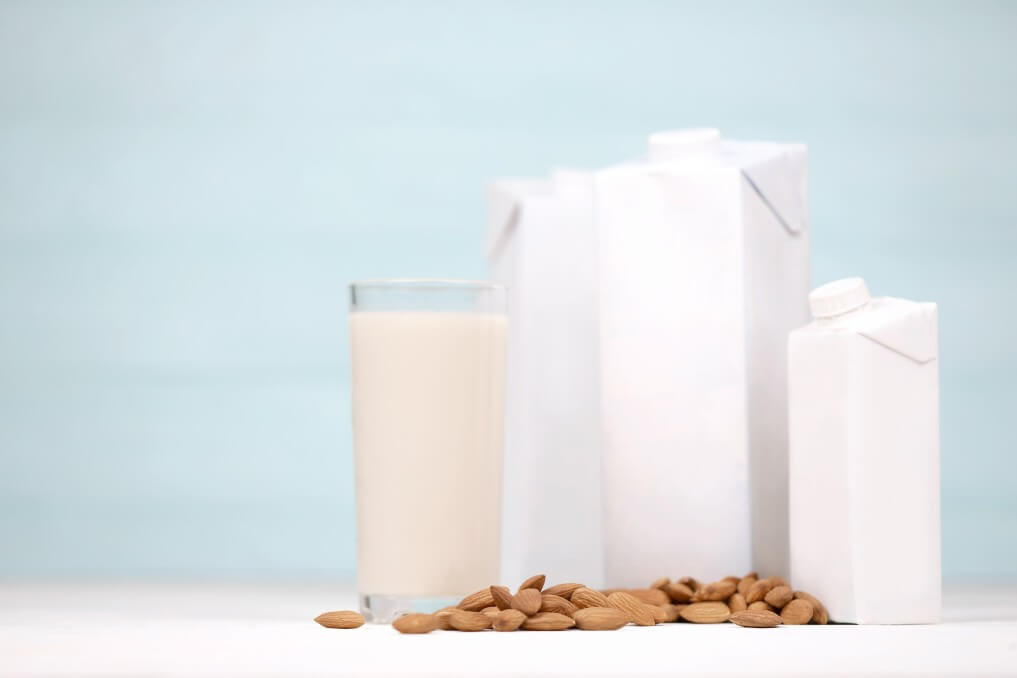
Store Bought Milk vs. Homemade Milk
As with almost any of the aforementioned plant-based milks, you will get more protein and more nutrients from them if you make them at home rather than purchase them in the store.
At home, you can control the nut and seed ratio to water.
The more of the original nut or seed you use compared to the water it is blended with, the less the nutrition will be strained out when you run the pulp through a nut milk bag. As a result, you’ll have a more nutritionally dense plant-based milk.
In addition, making your plant-based milks at home allows you to control what doesn’t go into the milk.
Many commercially produced plant-based milks use gums, fillers, sweeteners, and other ingredients that muck up the nutritional profile of the milk and add unwanted ingredients.
Lastly, fresh plant-based milk will always have a denser nutrient profile than the milk you buy at the store, with the exception of commercial fortified milks.
As plant-based milks age, they lose nutritional content, so the fresher the milk the better. You can only ensure this freshness by making the milk yourself.
The Highest Protein Plant Based Milk Is...
Soy milk offers the highest amount of protein per serving of plant-based milk compared to other milk options.
However, every plant-based milk has its own strengths. To keep your nutrition balanced, you may consider using a variety of plant-based milks and switching up what you purchase or make at home.
While protein is important, it isn’t the only thing to consider when choosing a dairy milk alternative.
